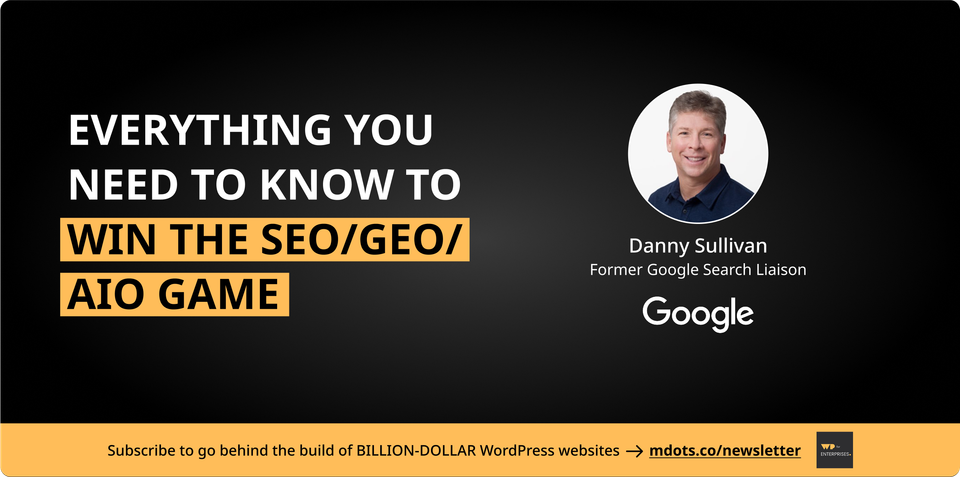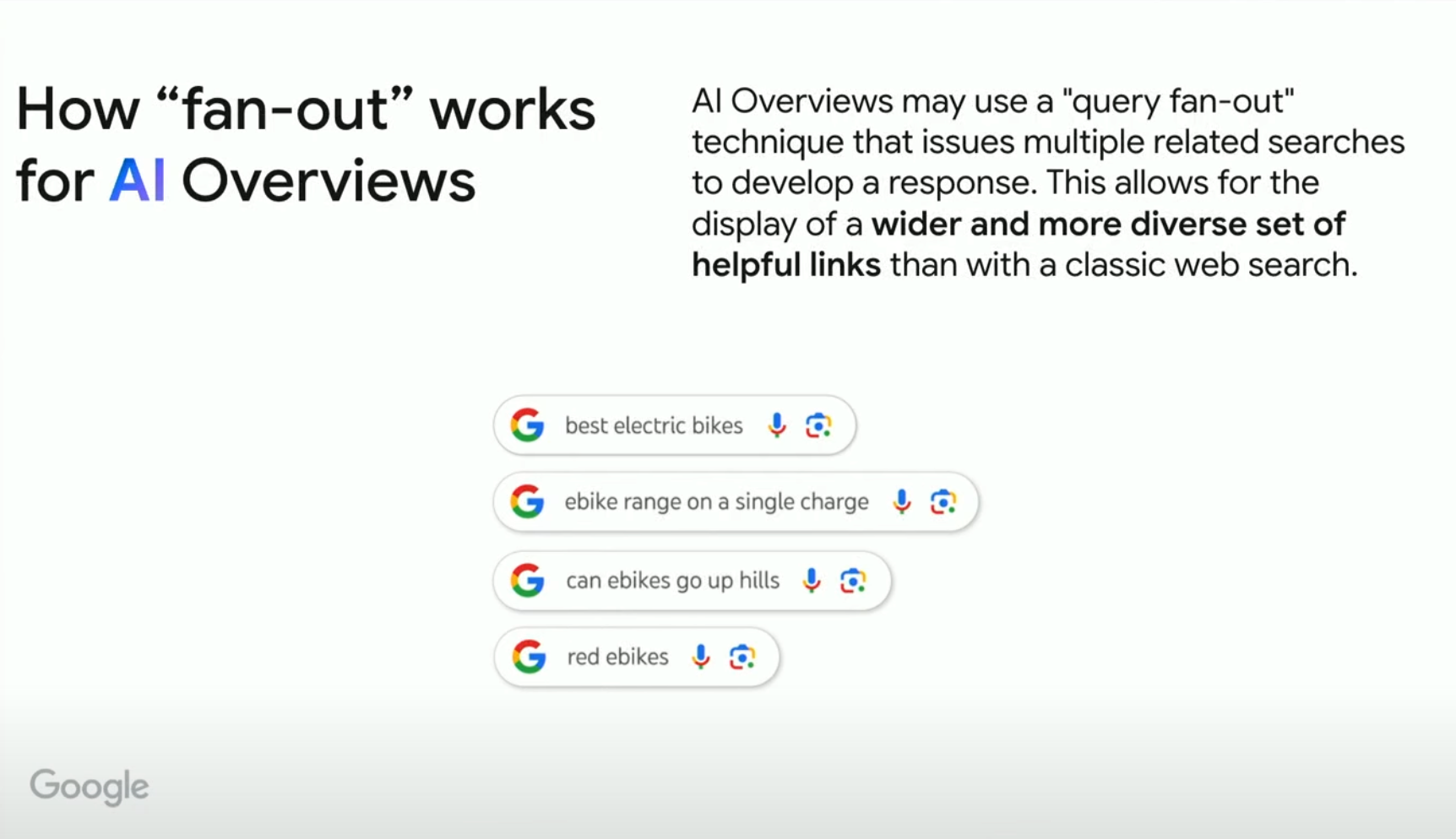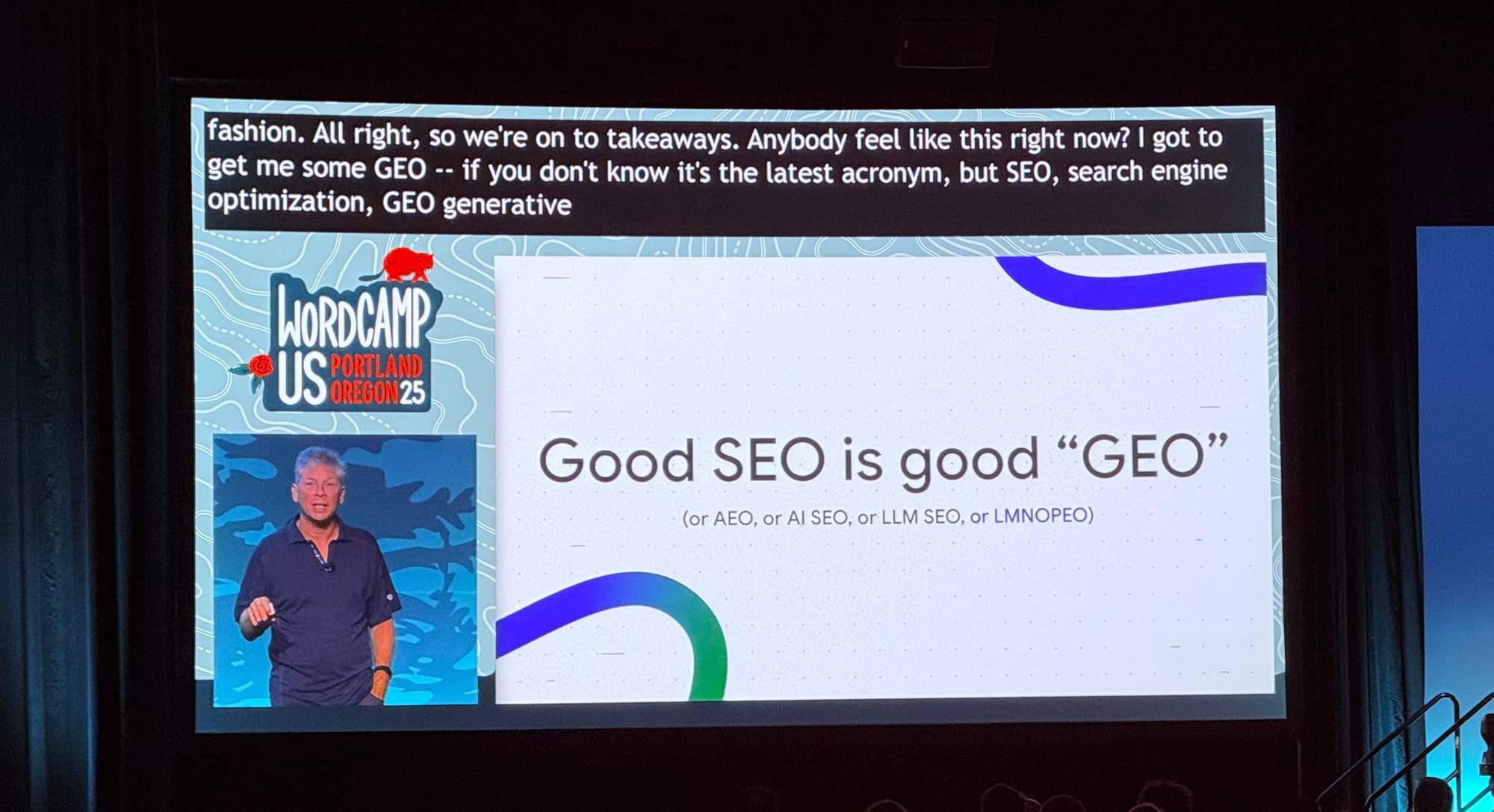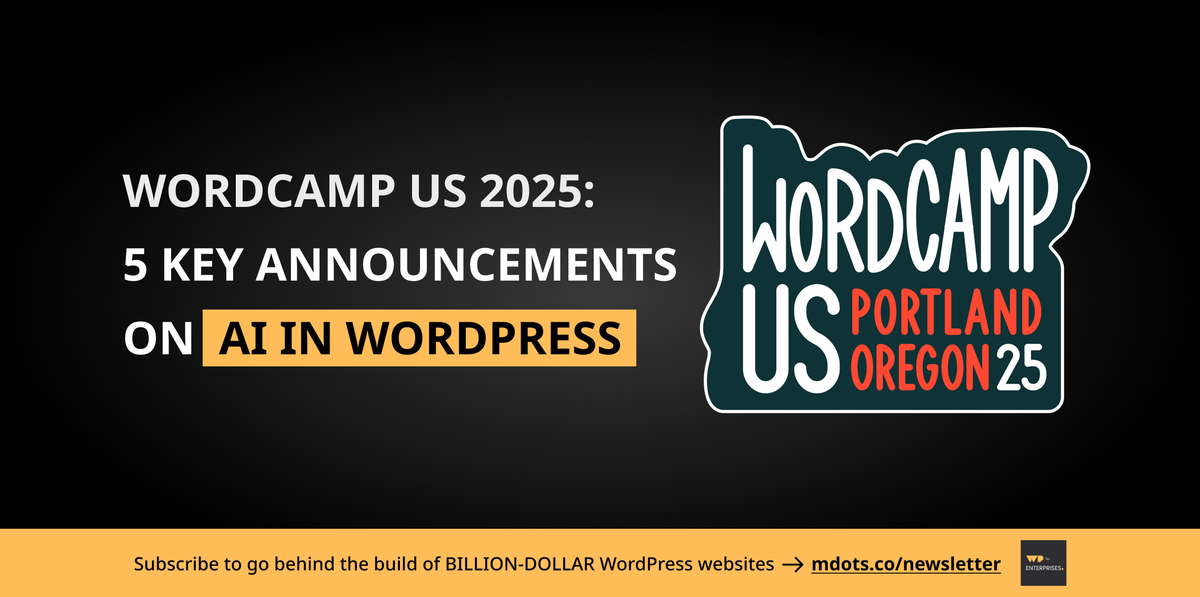5 Things I Learned About SEO/GEO/AIO from Danny Sullivan of Google

Welcome to WP for ENTERPRISES, where we go behind the scenes of BILLION-DOLLAR WordPress websites.
In this issue, you'll discover:
- Danny Sullivan's myth-busting truths about what Google really wants.
- How "query fan-out" creates more discovery opportunities for your content.
- Why page experience beats SEO tricks every time.
- Three new search features enterprise teams should prepare for.
In the previous issue, I shared five big AI announcements from WordCamp US 2025. But there was one particular talk that deserves its own deep dive.
Danny Sullivan, Director of Google Search (and former Google’s Search Liaison), gave what I’d call the most valuable session of the entire conference for marketing and tech leaders.
The room was packed. And for good reason.
With AI overviews shaking up search results and click-through rates sliding everywhere, every marketer and tech leader wanted answers.
And Danny delivered. He dropped real truth bombs about search myths, the actual impact of AI, and what really matters in 2025.

Here are the 5 big things I took away about SEO, GEO, and AIO—and what they mean for your brand.
1. AI OVERVIEWS ARE DRIVING MORE SEARCHES, NOT FEWER
Everyone's freaking out about AI overviews killing traffic. The actual data tells a different story:
- 10% increase in searches in major markets like the US and India.
- People are doing more complex queries they never attempted before.
- Users are visiting a wider variety of sites than before.
- Most importantly: higher engagement when people do click through.
That last point is crucial. People using AI overviews aren't just clicking randomly anymore. They're arriving at your site better informed and more engaged.

2. "QUERY FAN-OUT" = MORE CHANCES TO WIN
Here’s what most people don’t realize about AI overviews.
When you type: “ebikes in red for a 5-mile commute with hills,” Google doesn’t just match those exact words.
It "fans out" your query into dozens of related searches:
- "Best commuter ebikes"
- "Hills and electric bikes"
- "Red ebike models"
- "5-mile range batteries"
Then it synthesizes results from all those angles.
Translation: Your content has more ways to get discovered, not fewer.

3. GOOD SEO IS STILL GOOD SEO
Danny went hard on busting myths. His biggest headache? People overcomplicating everything.
What Google doesn’t care about:
- Word counts → write as long or short as you want
- “Expert reviewed” labels (unless they’re real)
- Meta tags for AI optimization
- Crazy-detailed schema for every little thing
What Google does care about:
- Unique, useful content for humans
- Smooth page experience
- Accessible content
- Pages that don’t make visitors say, “Ugh, I hate this”
Danny’s mic-drop:
Good SEO is good "GEO"

4. GREAT CONTENT + GREAT EXPERIENCE = GREAT SEO
Danny called out a huge problem: inconsistent web experiences.
On Instagram or TikTok, users know exactly what they're getting. Same format. Same navigation. Same expectations.
Then they land on a random website and it's chaos. Text here, widgets there, pop-ups everywhere.
SEO success comes down to two essentials: content that serves your audience and a page experience that keeps them around.
His advice: "Think about somebody coming to your page for the first time. Are they going to have a good experience?"
For enterprise sites: Your multi-million-dollar brand can't afford to lose visitors because your page experience feels like 2010.
5. GOOGLE WANTS SIMPLE ANSWERS FOR SIMPLE QUESTIONS
During Q&A, a travel blogger asked: "My click-through rates tanked. What are you going to do to compensate?"
Danny's response was honest: Some changes make sense. When people search "What time is the Super Bowl?" they don't want 10 paragraphs about Super Bowl history.
There are two types of information: simple, factual answers that people need quickly (which Google's AI will provide directly) and unique, valuable content that requires deeper exploration.
If you're writing 10 paragraphs just to answer "What time is the Super Bowl?" that's not a good user experience. And Google won't send clicks to that kind of content.
But for unique, valuable content? Google needs that content to exist. Without it, their entire system breaks down.
The commitment from Google's head of search:
We're committed to highlighting high-quality content on the web.
OTHER IMPORTANT TAKEAWAYS
A few more gems Danny shared:
- 15% of searches are new every day (Taylor Swift engagement, sports events create instant new queries).
- Words are tricky: "change" can mean replace, adjust, or exchange—context matters.
- 18-24 year olds especially like AI Overviews (higher adoption rate).
- Current spam update could mean more traffic if spam previously outranked you.
- New search features coming: Lens (image search), multimodal (video + questions).
- Individual experiences matter: Some love short videos, others prefer text.
- Web Guide feature: AI groups links helpfully instead of generic listings.
- Google Site Kit: Free tool to measure what matters in your WordPress dashboard.
- Reader Revenue Manager: Build newsletter subscribers directly from your site.
FINAL THOUGHTS
Danny’s talk made one thing clear: search evolution isn’t happening to us—it’s something we can ride to win.
Here’s what really hit me: the room was full of creators upset about lost clicks from AI overviews. But what’s actually changed is how people search.
Instead of “things to do in Hawaii,” they now type: “me, my wife, and my kid are going to Hawaii for 7 days. We love hiking. What’s easy and fun for us?”
That means our content needs to be personal and conversational. If we write like that, we stand a much better chance of showing up.
At Multidots, we're implementing several LLM optimization strategies for our enterprise clients:
- Optimizing for Microsoft Bing search index.
- Creating conversational, personalized content.
- Building better page experiences that work across all devices.
- Focusing on engagement metrics, not just traffic numbers.
The fundamentals haven't changed:
- Create content people actually want.
- Make your site experience not suck.
- Focus on helping humans solve problems.
Everything else like AI overviews, new search features, algorithm updates is just different ways of connecting people with helpful content.
Watch the full session on YouTube.
IN CASE YOU MISSED IT
By the way, in the previous issue, I shared "5 Big AI Announcements You Need to Know from WordCamp US 2025". Check out this link.
In this issue, you'll discover:
- AI-generated Gutenberg blocks from text prompts.
- One SDK to connect all AI providers (goodbye vendor lock-in).
- How AI assistants will control your WordPress site.
- The bridge to fully automated workflows.
- WordPress's official AI testing playground.

👋 Until next time, Anil | CEO and Co-Founder → Multidots, Multicollab & Dotstore.
P.S. I also write about personal growth and agency growth.

WP for ENTERPRISES is brought to you by Multidots, an enterprise WordPress web agency that’s been empowering big enterprises to scale and succeed with WordPress.

Whenever you're ready (no pressure), there are four ways we can help:
#1: Enterprise WordPress consulting – Think of us as your WordPress GPS. We’ll get you where you need to go.
#2: Migrate your website to WordPress – No stress, no mess—just a smooth ride to the WP world.
#3: Designing and building a new site – Your dream site, minus the nightmares.
#4: Optimizing and maintaining your site – Because nobody likes a slow website (or a hangry one).
📆 Book a quick, free call—no hassle, no commitment, just solutions that work for you.


Member discussion